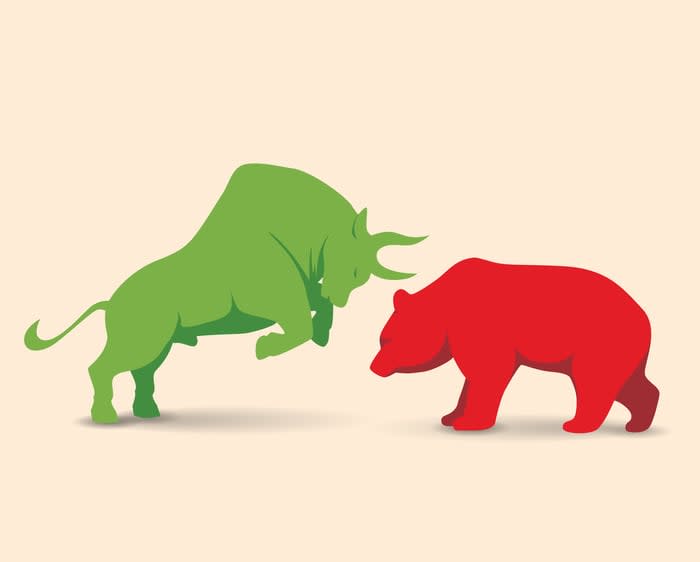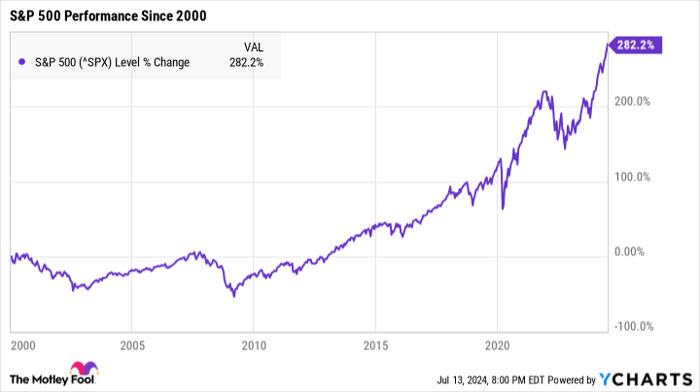Is a Stock Market Crash Coming in 2024? This Is How Long the Average Bull Market Lasts.
The stock market has been on fire throughout the last couple of years. The S&P 500 (SNPINDEX: ^GSPC) has soared by nearly 57% from its lowest point in late 2022, while the Dow Jones (DJINDICES: ^DJI) and Nasdaq (NASDAQINDEX: ^IXIC) are up by around 37% and 77%, respectively, in that time.
But the market can't continue surging forever, and eventually, we'll face another bear market or even a crash. While there's no way to know for certain whether that will happen in 2024, it can be helpful to see what history says about times like these -- and there's good and potentially not-so-good news about the future.
What the data says about bull markets
No two bull or bear markets are alike, so it's not always useful to compare them against each other. However, it can sometimes be helpful to see how long the average one lasts to potentially get a feel for where we're at in the current market cycle.

Image source: Getty Images.
The good news is that bull markets, in general, last far longer than bear markets. The average S&P 500 bear market since 1929 has lasted 286 days, according to data from investment group Bespoke, with the median just below that at 240 days.
Meanwhile, the average bull market between 1929 and 2023 has lasted 1,011 days, according to the data. However, there are a few outliers throughout history, with some exceptionally long and short market surges that can skew the data. The median may paint a more accurate picture of the typical bull market, and that figure is only 522 days.
The current S&P 500 bull market began on October 12, 2022 -- or 641 days ago, as of this writing. By that measure, this upswing has already lasted longer than the median bull market.
It's important to note, though, that bull markets have generally lasted longer in recent years. Of the last 10 bull markets dating back to 1970 (including the current one), half of them have gone on for at least 1,000 days. For comparison, of the market's first 10 bull markets between 1929 and 1939, only two lasted longer than 200 days -- with four lasting less than 100 days.
There's good news about the future
While many experts are making predictions about whether the market will crash in 2024 or how severe the next downturn will be, it's impossible to say with certainty where stock prices will be in the short term.
However, the market's long-term performance is all but guaranteed to be positive. While market downturns can be scary and cause your portfolio to plummet in the near term, the S&P 500 has a 100% success rate when it comes to recovering from even the worst market crashes.
Keep in mind, too, that you don't technically lose money in the market unless you sell at an inopportune time. Even if the market crashes, if you simply stay invested until stock prices inevitably recover, your portfolio should rebound without you losing anything.
The single best thing you can do right now to protect your investments is to ensure your portfolio is full of quality stocks, then hold them for the long term. Healthy companies are far more likely to survive tough times. By keeping your money in the market during a downturn, you'll be perfectly positioned to reap the rewards of rising stock prices during the next upswing.
Nobody knows exactly how long this bull market will last, but it's not unreasonable for some market surges to last for several years. Regardless of when the next downturn hits, though, buying quality stocks and holding them for the long term is the safest and most effective way to protect your portfolio.
Should you invest $1,000 in S&P 500 Index right now?
Before you buy stock in S&P 500 Index, consider this:
The Motley Fool Stock Advisor analyst team just identified what they believe are the 10 best stocks for investors to buy now… and S&P 500 Index wasn’t one of them. The 10 stocks that made the cut could produce monster returns in the coming years.
Consider when Nvidia made this list on April 15, 2005... if you invested $1,000 at the time of our recommendation, you’d have $791,929!*
Stock Advisor provides investors with an easy-to-follow blueprint for success, including guidance on building a portfolio, regular updates from analysts, and two new stock picks each month. The Stock Advisor service has more than quadrupled the return of S&P 500 since 2002*.
*Stock Advisor returns as of July 15, 2024
Katie Brockman has no position in any of the stocks mentioned. The Motley Fool has no position in any of the stocks mentioned. The Motley Fool has a disclosure policy.

